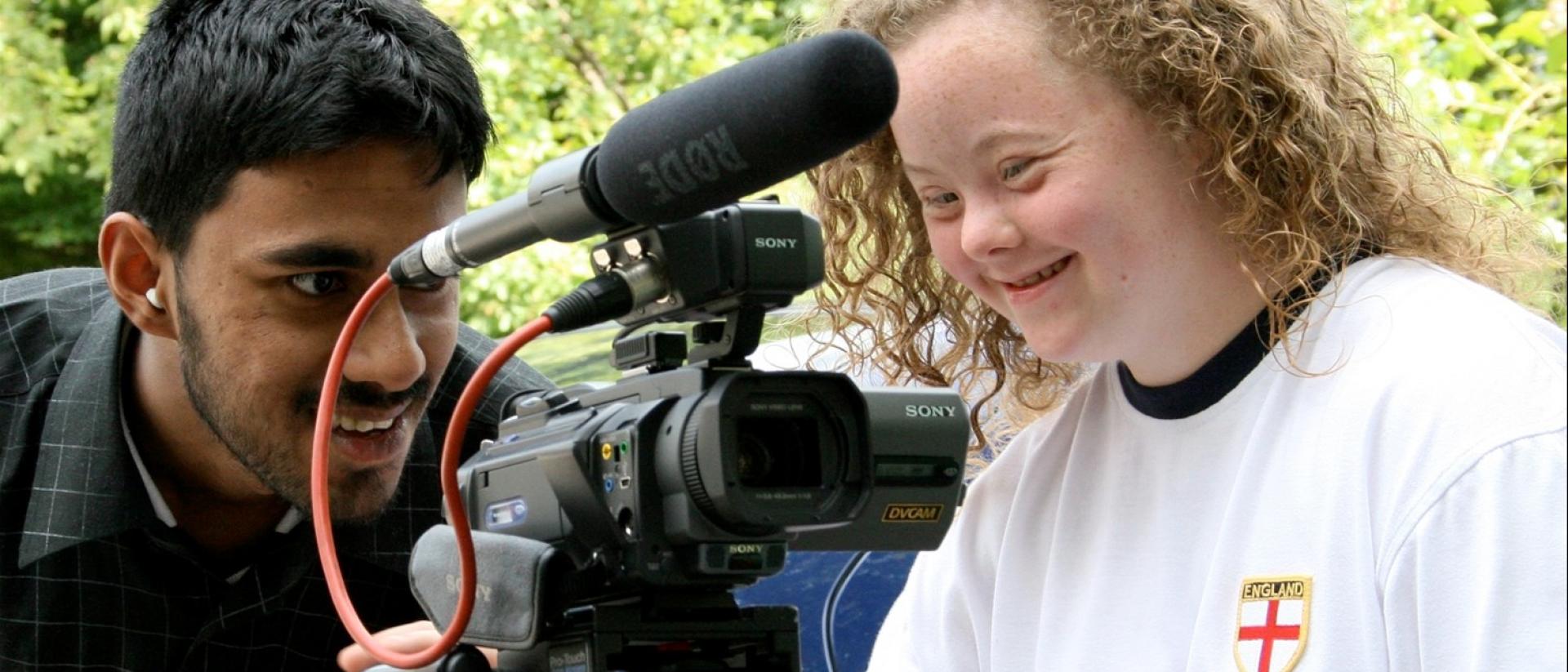Film for Everyone
Action Plan
Contents
Introduction
Film should be for everyone.
It has the potential to depict our unique struggles and joys, improving our sense of belonging; it can help us to understand ourselves and each other better; and it can transport us, if only for ninety minutes, into a world of boundless possibilities.
However, there are still huge portions of society who are prevented from accessing and benefiting from film in the way that others do. Whether it’s being able to physically access cinemas, having a relative who works in the industry or a couch to sleep on in London, having the (predominantly white) cultural references that some mistake for expertise, being comfortable doing business over a drink or working long hours away from home, or the fact that you’ve rarely seen yourself depicted on the big screen so don’t feel like film is for you: the list of barriers to working or participating in film is very long and often intersectional across race, gender expression, sexual orientation, class, D/deafness, Disability and Neurodiversity and the Welsh language, among other lived experiences.
Statistics suggest that there has been some improvement in the diversity of our sector in the past few years. However, we believe that we will only move the dial when it comes to diversity if we make a new dial. We believe that re-imagining more inclusive ways of working, learning and celebrating film, committing to advertising roles and involving under-represented audiences in the development of film, for example, is the only way that we will create the kind of replicable and sustainable change, which will benefit us all. We don’t believe we should do this work in isolation. We know what we don’t know and that there are many people and organisations out there who are already doing fantastic work that we can learn from. We want to work in meaningful partnership with the communities we want to reach; we want to help to scale up existing examples of good practise; we want to share learning, creating safe and non-extractive environments; and we want to challenge ourselves continually to leverage the position we have to best support those people who may have found us hard to reach.
This plan builds upon our Equality, Diversity and Inclusion Action Plan 2018-2022, to guide both our own activities and those we support. This plan is in line with our 2018-24 strategic plan, Welsh Language Plan and forms the foundation for our Strategic Plan 2024-30. It incorporates our responsibilities as a delegate of the Arts Council of Wales and the British Film Institute. It is also informed by consultation Ffilm Cymru has undertaken with people with lived experience and expertise as well as our stakeholders, a review of our current activities and the diversity data we hold, as well as the broader legislative context, specifically the Equality Act and the Welsh Language Act.
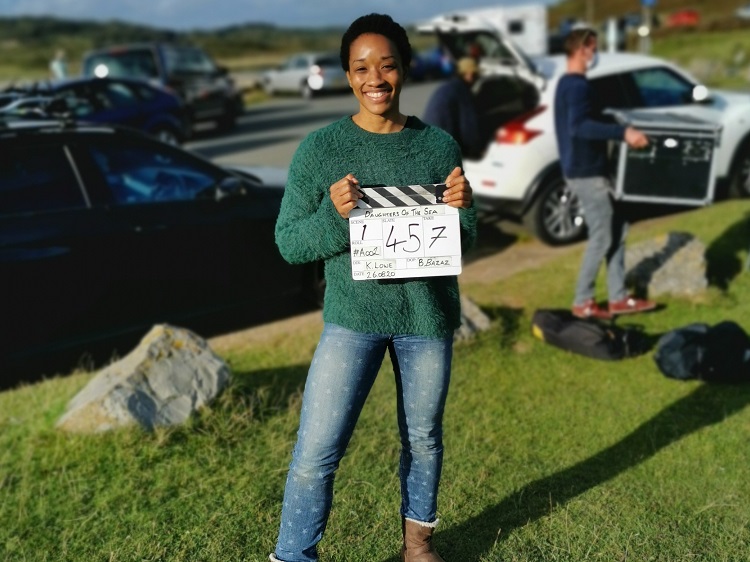
Scope
This plan applies to Ffilm Cymru’s Board and staff in developing and implementing our strategic priorities and the interventions that follow, including funding decisions, contractual obligations and the working practices that we encourage. The values described in this plan provide a framework for our partnership work – including when working with individuals and organisations that are applying their breadth of lived experience to review, challenge and offer insights and recommendations for change.
It also applies to those we invest in – from exhibitors, to education practitioners, to filmmakers, distributors and community cultural providers. We are asking all of our funding recipients to champion the principles of this plan, and to formulate and share their own ideas on how they can advance equality, diversity, and inclusion through their work.
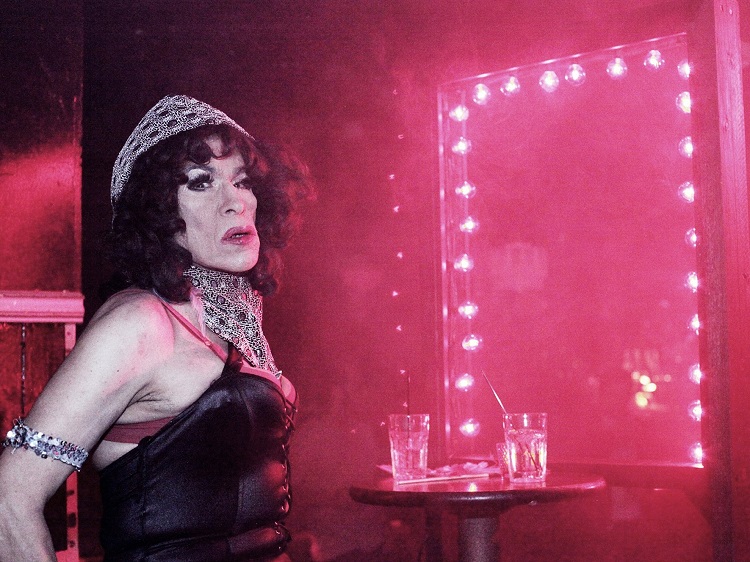
In this plan we will focus on the following priority areas, always mindful of how they might intersect:
- Women (whether assigned at birth or not)
- LGBTQI+
- d/Deafness, Disability or Neurodiversity
- People of the Global Majority (including gypsies or Irish travellers)
- Socio-economic background
- Welsh Language
- Young people, particularly in relation to our film education work.
Our Guiding Principles
- That equality, diversity, and inclusion are essential for powerful storytelling and a sustainable film sector.
- That our industry is not a meritocracy and that we need to be anti-racist, anti-ableist, anti-classist, and a champion for women, the Welsh Language, and the LGBTQI+ community. This means actively scrutinising our ways of working, championing others, and speaking up about inequalities and disparities. It means educating ourselves by compiling and sharing reading lists and not just relying on paid consultants or particular members of our team.
- That as a national organisation and Community Interest Company we have responsibility to support and facilitate access and inclusion across all of Wales. This means routinely considering and measuring geographic representation when considering awards, events, participants and public access. We know that there are centres of focus for the industry, where services, facilities and/or infrastructure encourage a greater concentration of work, such as Cardiff and Camarthen, but we will consciously encourage and look for opportunities to support the broadening of geographic benefits.
- That everyone should be paid for their work if they are out of full-time education and not volunteers. This applies to panel discussions, talks, masterclasses, mentorship, feedback forums and consultancy, commissions, and funding awards at all levels of experience. We believe that if we perpetuate the ‘favour culture’ in our industry, we rule out a huge percentage of our population from thinking this industry is for them. We know that funding for the arts is limited and budgets are always tight. But if we can’t afford to pay everyone as part of an initiative, then we shouldn’t do it. Or we should partner with other organisations trying to do the same thing.
- That participating or working in the film sector shouldn’t rely upon non-financial social assets. That means among other things that people should be able to communicate their ideas to us without needing specialist language. It means advertising opportunities, avoiding jargon, being transparent about what we’re looking for, signposting support that’s available rather than assuming people will have the confidence to ask. It means recognising that confidence is in itself a privilege and not the hallmark of talent.
- That we need to mainstream change and not rely on ‘Diversity’ schemes, panels and events. That means moving beyond ‘Diversity’ labelled activity, which homogenises hugely varied lived experiences and implicitly suggests that diversity is the problem, rather than the way our sector works. It means understanding that many people have been marginalised within schemes, never succeeding to get a commission, for example, and that we must build legacy into everything we do.
- That we should work in partnership and design activity around those we want to reach adopting the #NothingAboutUsWithoutUs principle championed mostly recently by D/deaf, Disabled and Neurodiverse networks.
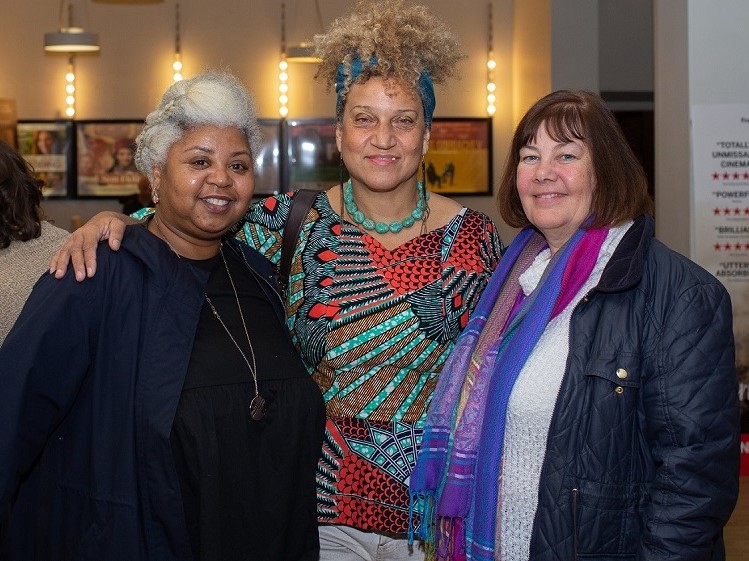
Our Targets
Our targets are informed by demographic data for Wales, rounded up to the nearest half percentage, and varied where that census data is identifiably inadequate (see references):
- Women: 52% (1)
- LGBTQI+: 10% (2)
- d/Deaf, Disabled or Neurodiverse: 23% (3)
- People of the Global Majority: 10% (4)
- Socio-economic background: 25% (5)
- Welsh Language: 29% (6)
- Young People: Benchmark in year
-
Increased from 50%, noting women account for 52% of the working age population of Wales
-
The LGBTQ+ population has not been adequately reflected in census language historically
-
5.5% of the working age population of Wales are BAME according to this data, but there are significant gaps including the Romany community, and we recognise this as an area where we particularly need to focus. We prefer not to use the acronym BAME.
-
23% of people are estimated to be living in relative income poverty in Wales
-
Taken from Wales’ Annual Population Survey for the year ending March 2021. It includes Welsh speakers (whether fluent or learners).
For all of the above, this percentage applies, per financial year, to:
- Target 1: % writers, directors and producers we support with film funding
- Target 2: % personnel of companies we support with company-level investment, as well as exhibition and education fund awards
- Target 3: % participation in career development opportunities we deliver or support others to deliver, subject to securing sufficient data responses
- Target 4: % participation in film education and exhibition activity we support
- Target 5: % total crew who work on Ffilm Cymru films, subject to a review of availability of data to set a target
In addition to this, Ffilm Cymru monitors the on-screen representation and below-the-line hiring on projects as a conscious consideration within the decision-making process and throughout our process of supporting funded filmmakers. We are committed to the development of Welsh-language content (as outlined in our Welsh Language Plan).
We publish our statistics on an annual basis within our Annual Reports. As a relatively small fund, each award may have a significant impact on our overall statistics for each of our priority areas. We review our targets annually and expect to update again in line with the results of the 2021 Census, expected to be published in 2023.
Setting targets is a useful reminder of the action that needs to be taken, but it doesn’t in itself create the kind of inclusive environment in which everyone can thrive in the long-term. Demographic data collectors such as the Census are also, by their design, unlikely to attract the true participation of those commonly marginalised in society. That’s why we’re committed to the following actions.
What We'll Do
Aim: Our workers and board represent the community we serve.
Actions:
- Board recruitment strategy and introduction of honorarium for board roles
- Status: in effect
- All board and staff take part in unconscious bias, anti-racism, and Disability awareness training
- Status: in effect
- Develop a pool of external assessors to increase the lived experience reflected in our decision-making process, including utilising the Arts Council for Wales’ Creative Associate cohort
- Status: In effect, but open call planned for 2023-24
- All job adverts offer automatic interviews to candidates meeting the minimum criteria who identify as people of the global majority or as d/Deaf, Disabled or Neurodiverse
- Status: in effect
- All job adverts advertised widely and via diverse networks
- Status: in effect
- All job adverts available in accessible and bilingual Welsh/English format, applications accepted in video, hard copy, email, or over the phone, and support available for candidates to apply if they face barriers.
- Status: in effect
- We will develop a ‘partnership agreement’ with everyone we hire, opening a conversation about how they work best and support them to work differently if required, ensuring we retain staff who reflect our priority areas.
- Status: in effect
- We will retain Welsh speaking staff and ensure that all staff understand our Welsh Language Plan.
- Status: in effect
- We will include a section on micro-aggressions in the staff handbooks and incorporate into the disciplinary and performance policies.
- Status: In development 2023-24
- We will work with the other national arts organisations to develop structured mentoring and employment opportunities for people of the global majority or who are d/Deaf, Disabled or Neurodiverse.
- Status: Collaborative anti-racist leadership plan, funded for action 2023-24 onwards
- We will undertake senior management, reverse mentoring through a disability led organisation.
- Status: Completed in 2022-23, leading to the development of a company access guide with Disability Connect and a season of teach sessions. In effect.
- We will value time given and lived experience shared. Individuals and those in micro or small companies will always be offered remuneration for work undertaken, in addition to expenses.
- Status: in effect
- Status: in effect
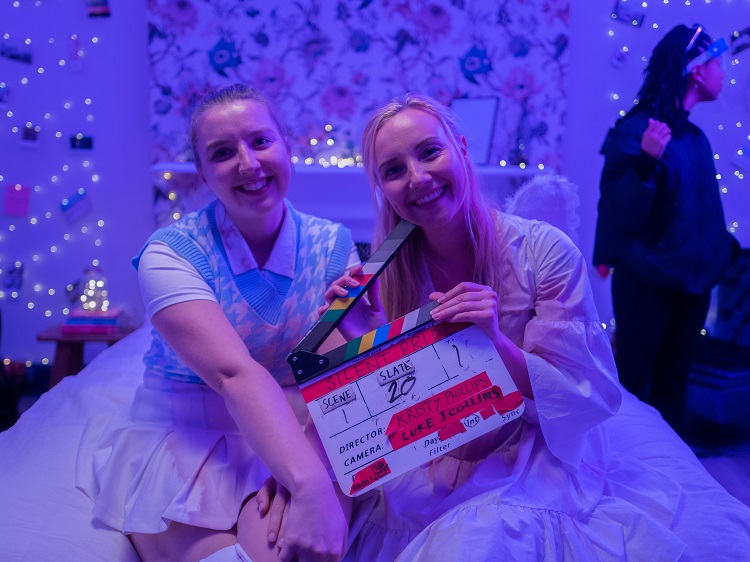
Aim: The people we directly support reflect the community we serve.
Actions:
- We will support all our production funding recipients with the development of an EDI Action Plan encouraging in particular, the advertisement of roles, and require all of our Education and Audience fundees to develop EDI plans that advance and are appropriate to their work.
- Status: in effect
- We will ringfence funding to provide top-up support for projects that develop strong proposals to improve the authenticity or representation of their film projects, for e.g workshopping with the community depicted, providing a creche on set.
- Status: in effect
- We will require those we fund to monitor the diversity of those they hire or reach with our funding.
- Status: in effect
- We will support those we fund with advice, resources and inspirational case studies on how they could make their work more inclusive.
- Status: in effect
- We will ask those we fund to widely share their Code of Conduct, or develop from our white label Code of Conduct, and to help to combat bullying, harassment and sexual harassment in the sector.
- Status: in effect
- We will encourage those we fund to test their ideas during the development stage via our Magnifier approach, facilitating test screenings or readings with specific communities, and the exploration of complementary materials that could expand the project’s reach.
- Status: in effect
- We will facilitate those we fund to mentor newer talent or place them into shadowing placements, helping awardees to structure the experience.
- Status: in effect
- We will advocate for improved workforce data collection, particularly in the context of Wales, working alongside Welsh Government, DCMS, the BFI, Creative Skillset, ACW and others, and will publish workforce data that we have, in order to encourage best practise.
- Status: in effect
- We will champion the needs of freelancers and independent filmmakers, exhibitors, and educators of Wales (for example, when we advocated for the Welsh Government’s freelance support fund during the covid-19 pandemic).
- Status: in effect
- We will require the creation of disability access materials for every film we fund with production funding.
- Status: in effect
- We will support the piloting of Wellbeing Facilitators on productions, in partnership with Welsh Government, the unions, the BFI and others.
- Status: in effect
- We will facilitate the co-design of a Fair Work Charter working with people who experience economic disadvantage, third sector, training providers and industry. Contributed to PEC Good Work review and preparing to implement Welsh Government priority recommendations.
- Status: in effect
Aim: The ways of working in the sector support the community we serve.
Actions:
- We will ensure all staff consciously ensure that their day-to-day work engages a diverse and representative range of individuals – whether scheduling meetings at festivals, markets, or other sector events.
- Status: in effect
- We will review our diversity statistics as a team annually, discussing what we think we could do better in some areas and sharing ideas.
- Status: in effect
- We will be as available as possible to applicants who want advice on their application
- Status: in effect
- We will ensure that our funding is always advertised. We will ensure that our guidelines and application forms are available in accessible formats and bilingually in Welsh and English, with applications accepted in video, hard copy, email, or over the phone, and support available for applicants to apply if they face barriers.
- Status: in effect
- We will work in partnership with community groups and diversity organisations such as Disability Arts Cymru, to run group advisory sessions providing pre-application support.
- Status: in effect
- We will consult with Disability experts, such as Attitude is Everything on our funding guidelines and application process.
- Status: in effect
- We will ensure that our communications are anti-racist, anti-ableist and inclusive.
- Status: in effect
- We will retain Welsh speaking staff to support with applications.
- Status: in effect
- We will always offer bursaries for training or events we deliver.
- Status: in effect
- We will develop an EDI Stress Test to be completed in the planning of each Ffilm Cymru event or training program through which we evaluate speakers, experts, venues and other access considerations, as well as marketing and promotion channels or methods.
- Reviewing and formalising
- We will support peer group activity to redress under-representation (e.g. SHIFFT female filmmakers group, the Hijinx academy of neurodivergent actors);
- Status: in effect
- We will continue to evolve our training programme for socio-economically disadvantaged individuals in Wales – our pioneering Foot in the Door programme.
- In effect
- We will offer bilingual and/or BSL or text-streamed services as standard on our events and training.
- Status: in effect
- We will co-design future funding and training activity with people who have lived experience in the areas we are seeking to support.
- Status: in effect
- We will develop a ‘partnership agreement’ with everyone we fund, opening a conversation about how they work best and supporting them to work differently if required, ensuring that everyone thrives in the process of working with us, and wants to work with us again.
- Status: in development 2023-24
- We will ringfence a budget to support awardees’ access, for diversity elements such as the cost of care, so that it doesn’t compete with the core costs of the project and put the applicant into a difficult position.
- Status: in effect, reviewing implementation
- We will ensure our staff engage with and travel to different areas of Wales to offer advice, including working in community centres and the places we fund with our film education and exhibition funding.
- Status: In effect, with in-person subject to covid-19.
- We ordinarily require at least 3 Wales-based paid trainees on every production we fund.
- Status: in effect
Language & Terminology
Simply, equality means treating everyone fairly. It is not about treating everyone the same but making sure that no-one is disadvantaged due to their differences. Diversity is a term used to describe the fact that everyone is different and that the differences should be respected, recognised and valued. By inclusion we mean an approach and practice that brings people together within the creative industries environment, providing the conditions for everyone to work or participate in the way they want to.
It's important to acknowledge the limitations and reductive nature of terminology, which is a social construct, but also its’ value in evidencing areas of inequality. There are two important aspects to highlight in our EDI approach:
- That any term is less than the person it describes. Terminology is not intended to prohibit self-determination or the nuance of self-identity, including intersectionality. Intersectionality refers to the multiple identities we all have, some of which might offer social advantages whilst others disadvantage.
- That we regularly review and adapt language, as part of our annual EDI reviews, drawing upon feedback submitted within our diversity monitoring forms, and insights we pay for as part of our #NothingAboutUsWithoutUs approach.
- We recognize the social model of Disability and the cultural model of Deafness and use the term ‘d/Deaf, Disabled or neurodiverse’
- We also use the decolonized term People of the Global Majority rather than Black, Asian or Minority Ethnic, or its acronym, in rejection of ‘othering’ or centring the white point of view through the colonization of language.
- We recognize the hugely different lived experiences within the d/Deaf, Disabled and neurodiverse community and within the term People of the Global Majority and provide more detailed definitions within our monitoring form, and encouraging people to self-describe.
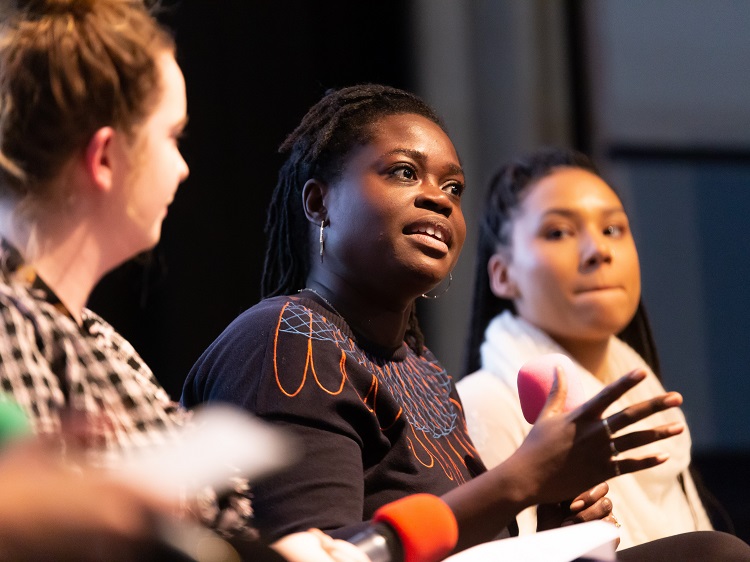
Further Reading
The following reports will provide further context to this document:

